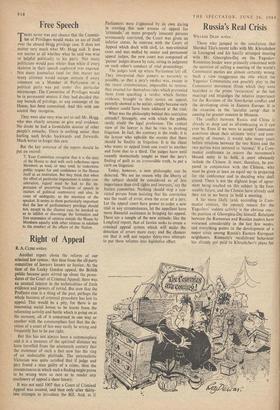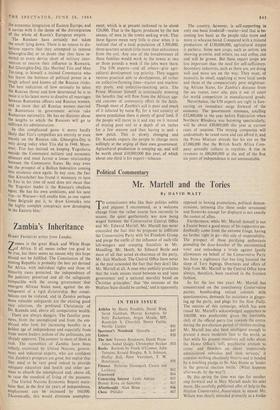Russia's Real Crisis
WILLIAM DEAN writes :
Those who jumped to the conclusion that Marshal Tito's recent talks with Mr. Khrushchev in Leningrad and his hastily arranged meeting with Mr. Gheorghiu-Dej on the Yugoslav- Rumanian border were primarily concerned with the question of calling a meeting of the world's Communist parties are almost certainly wrong. Such a view exaggerates the role which the Yugoslav Communists can possibly play in the Communist movement (from which they were banished as the prime 'revisionists' at the last meeting) and misjudges the relative importance for the Russians of the Sino-Soviet conflict and the developing crisis in Eastern Europe. It is the situation in the 'socialist camp' that is causing far greater concern in Moscow.
The conflict between Russia and China is already as deep and as all-embracing as it can ever be. Even if we were to accept Communist assertions about their ultimate 'unity' and com- munity of interest, it would take many years before relations between the two States and the two parties were restored to 'normal.' If a Com- munist conference to restore the movement's blessed unity is to held, it must obviously include the Chinese. It must, therefore, be pre- pared in conjunction with the Chinese, who must be given at least an equal say in preparing for the conference and in deciding who shall attend. There is not the slightest hope of agree- ment being reached on this subject in the fore- seeable future, and the Chinese have already said they are in no hurry to hold a meeting.
A far more likely (and, according to Com- munist sources, the correct) reason for the Yugoslays' sudden activity is the obvious one: the position of Gheorghiu-Dej himself. Relations between the Rumanian and Russian leaders have worsened considerably in the last few weeks, and everything points to the development of a major crisis among Russia's Eastern European neighbours. Rumania's recalcitrant behaviour has already put paid to Khrushchev's plans for the economic integration of Eastern Europe, and it carries with it the threat of the disintegration of the whole of Russia's European empire.
The Russians have certainly not taken the revolt lying down. There is no reason to dis- believe reports that they attempted to remove Gheorghiu-Dej or to .doubt that they have re- sorted to every device short of military inter- vention to restore their influence in Rumania. But Gheorghiu-Dej, like Marshal Tito and Mao Tse-tung, is himself a trained Communist who has learnt the business of political power in a tough school and knows all the Russian tricks. The best indication of how seriously he takes the Russian threat and how determined he is to resist it is his latest move to dissolve all marriages between Rumanian officers and Russian women, and to insist that all. Russian women married to Rumanians in government service take Rumanian nationality. He has no illusions about the lengths to which the Russians will go to infiltrate his administration.
In this complicated game it seems hardly likely that Tito's sympathies are entirely or even mainly on the Russian side. Gheorghiu-Dej is only doing today what Tito did in 1948. More- over, Tito has insisted on keeping Yugoslavia outside the Communist military and economic alliances and must favour a looser relationship between the Communist States. He may 'even see the prospect of a Balkan federation coming into existence once again. In any case, the fact that Khrushchev has found it necessary to turn to Tito in his time of need does not mean that the Yugoslav leader is the Russian's obedient agent. He has his own ambitions, and his next trip--to Warsaw—will enable him, as one report from Belgrade put it, to 'draw Gomulka into the highly complex conspiracy, now developing in the Eastern bloc.'



































 Previous page
Previous page